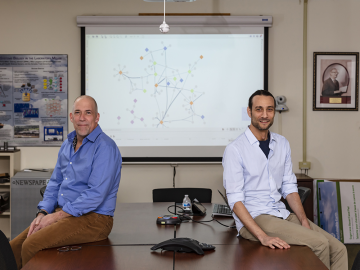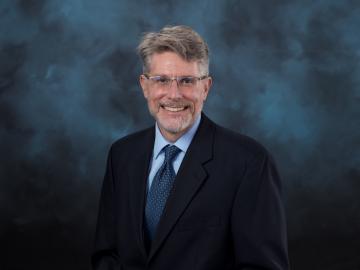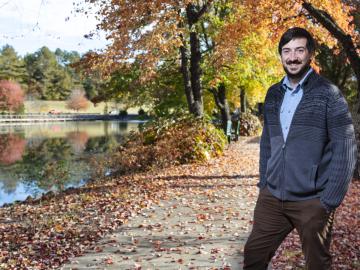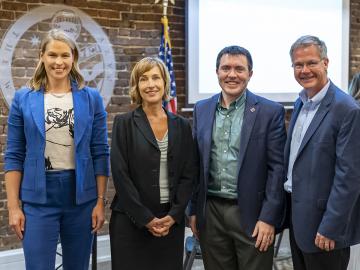
Filter News
Area of Research
- Biology and Environment (55)
- Biology and Soft Matter (1)
- Computational Biology (2)
- Computational Engineering (2)
- Computer Science (2)
- Electricity and Smart Grid (1)
- Energy Science (28)
- Functional Materials for Energy (1)
- Fusion and Fission (2)
- Isotopes (1)
- Materials (10)
- Mathematics (1)
- National Security (7)
- Neutron Science (3)
- Nuclear Science and Technology (4)
- Supercomputing (50)
News Topics
- (-) High-Performance Computing (130)
- (-) Hydropower (12)
- (-) Molten Salt (10)
- 3-D Printing/Advanced Manufacturing (146)
- Advanced Reactors (40)
- Artificial Intelligence (131)
- Big Data (79)
- Bioenergy (112)
- Biology (128)
- Biomedical (73)
- Biotechnology (39)
- Buildings (74)
- Chemical Sciences (86)
- Clean Water (33)
- Composites (35)
- Computer Science (226)
- Coronavirus (48)
- Critical Materials (29)
- Cybersecurity (35)
- Education (5)
- Element Discovery (1)
- Emergency (4)
- Energy Storage (114)
- Environment (218)
- Exascale Computing (67)
- Fossil Energy (8)
- Frontier (64)
- Fusion (66)
- Grid (74)
- Irradiation (3)
- Isotopes (62)
- ITER (9)
- Machine Learning (68)
- Materials (157)
- Materials Science (158)
- Mathematics (12)
- Mercury (12)
- Microelectronics (4)
- Microscopy (56)
- Nanotechnology (64)
- National Security (86)
- Neutron Science (171)
- Nuclear Energy (122)
- Partnerships (68)
- Physics (69)
- Polymers (35)
- Quantum Computing (53)
- Quantum Science (92)
- Security (31)
- Simulation (65)
- Software (1)
- Space Exploration (26)
- Statistics (4)
- Summit (71)
- Transportation (103)
Media Contacts

John “Jack” Cahill is out to illuminate previously unseen processes with new technology, advancing our understanding of how chemicals interact to influence complex systems whether it’s in the human body or in the world beneath our feet.

ORNL researchers discovered genetic mutations that underlie autism using a new approach that could lead to better diagnostics and drug therapies.

ORNL appointed Peter Thornton as director of its Climate Change Science Institute, or CCSI, effective November 1, 2022.

Matthew Craig grew up eagerly exploring the forest patches and knee-high waterfalls just beyond his backyard in central Illinois’ corn belt. Today, that natural curiosity and the expertise he’s cultivated in biogeochemistry and ecology are focused on how carbon cycles in and out of soils, a process that can have tremendous impact on the Earth’s climate.

Millions of miles of pipelines and conduits across the United States make up an intricate network of waterways used for municipal, agricultural and industrial purposes.

The Earth System Grid Federation, a multi-agency initiative that gathers and distributes data for top-tier projections of the Earth’s climate, is preparing a series of upgrades.

ORNL researchers are deploying their broad expertise in climate data and modeling to create science-based mitigation strategies for cities stressed by climate change as part of two U.S. Department of Energy Urban Integrated Field Laboratory projects.

Gang Seob “GS” Jung has known from the time he was in middle school that he was interested in science.

A crowd of investors and supporters turned out for last week’s Innovation Crossroads Showcase at the Knoxville Chamber as part of Innov865 Week. Sponsored by ORNL and the Tennessee Advanced Energy Business Council, the event celebrated deep-tech entrepreneurs and the Oak Ridge Corridor as a growing energy innovation hub for the nation.

ORNL has provided hydropower operators with new data to better prepare for extreme weather events and shifts in seasonal energy demands caused by climate change.


